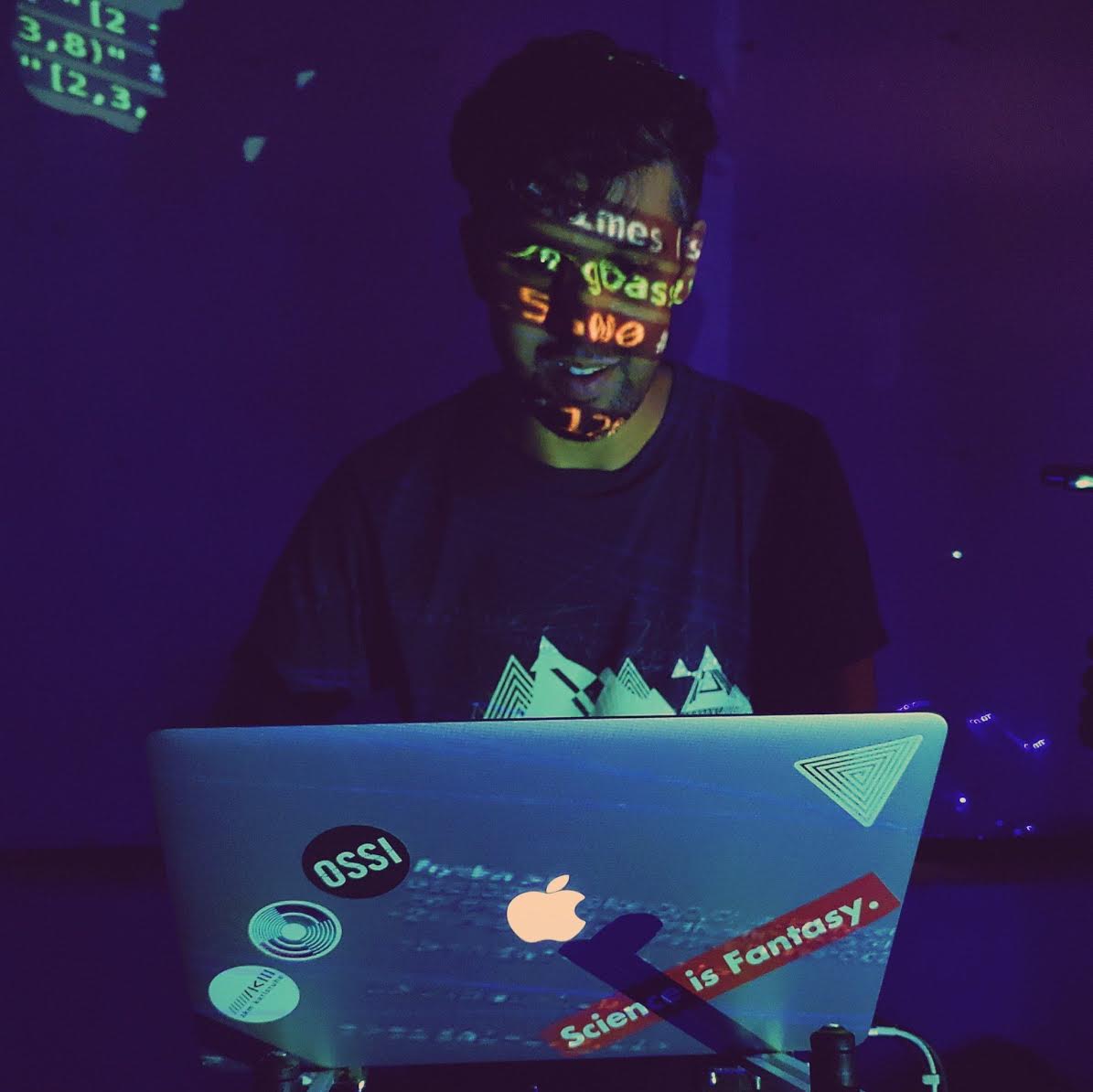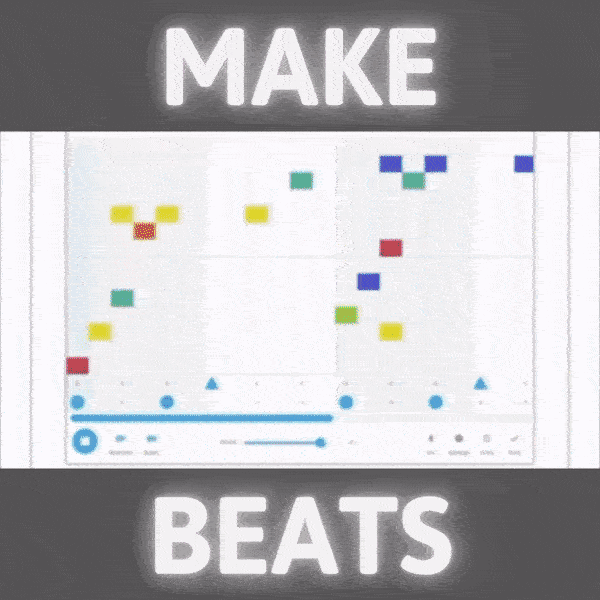Abhinay Khoparzi is a multidisciplinary creative technologist who maintains a practice across film, video, music and web technologies. He has had a long relationship with the experimental electronic music scene in Mumbai, India with performances at venues and events like The Indian Electronica Festival, (Blue Frog), 6 Foot Oscillator in a 4 foot Room (Zenzi Mills). Since 2018 Khoparzi has been organising and curating computational arts events called “Algoraves” all India. He has performed live coded music and visuals with TidalCycles and Hydra at Fat Finger Mayhem (Max Mueller Bhavan, Mumbai, 2018 and 2019), Algorave Sheffield (UK, 2018), International Conference of Live Coding (Madrid, 2019), and Algorave Bangalore(2019). He now organises/conducts live coding workshops in collaboration with various maker spaces and artists collectives across India and has been pushing the Algorave scene in the country.
Interview with Abhinay Khoparzi
Tell us about your background
I come from a small town in the north India where the only way to look and be successful is become a doctor/lawyer/engineer or teach at a “coaching centre” to become a doctor/lawyer/engineer. Luckily I had access to technology early on and got the time and space to teach myself to code with web stacks back in the early late nineties and early noughties. I was also lucky to have parents willing to stand a teenager bashing a drumset in his bedroom while he lived with them. Being in a “small town” (at least what it means in India) also meant that I had to maintain and fix all of the tech I could get my hands on for any “creative” applications. An amalgamation of spending all of this time building/fixing things ended up helping me narrowly avoid going to medical school and move to Bombay with double diplomas in sound engineering and CGI and visual effects (no one taught these things at Universities in India back in those days).
After switching through jobs in sales, sound engineering, writing for a technology magazine while helping run an independent artist collective, netlabel and building a IDM/breakcore scene in the city known for churning out vast quantities of Bollywood Music, we quickly realised we had to start working for ourselves. The artist collective went defunct early on but the talent and connections acquired resulted in a micro budget, crowd funded, indie feature film done by a crew of two (friends helped out on weekends) filmed on a borrowed ENG camera and a lot of DIY hardware, software and workflows. The film got rejected from all local festivals but premiered in Chicago and was traveled and celebrated all across the world. Since the mainstream scene didn’t get it at the time, I was able to make use of my art+tech aesthetics and tooling for freelancing in the advertising market. By the time the film reached back home and got into theaters I got the opportunity to pack my bags and run off to Birmingham, UK for a Masters in TV Production at BCU. The university and my supportive Course Director helped me redesign the course for freelance work and get me to work on brand films for clients like Hasselblad and Aston Martin Racing.
Due to my love, drum and bass, footwork and the harder sounds of the electronic music scene and art + technology I also bumped into the still nascent Algorave scene that was starting to take shape in the country. After a brief entrepreneurial stint that was cut short by the economic uncertainties of the Brexit vote, I moved back to my hometown in India. A random connection with an old friend from the scene in Bombay we started Algorave India in 2018. An Indian chapter of the global livecode movement that had deep aesthetic and ideological connections with our “underground scene” from years ago. I now organize workshops and livecode performance events all over the country and work with creatives and technologists to make experiences for brands, arts organizations and institutions.
What is your definition of art + tech?
I can’t think of making anything without tools, and tools are tech. Whether those tools are digital or physical that is immaterial. Musicians need Instruments, painters, illustrators need brushes/pens, kids need toys to spin up stories from their heads. Somebody has to make those tools, I like making the works as well as the tools that help you make those works. So in the end art needs tech and then making the tech itself becomes the art.
Who, or what, inspires you in your art and in your life?
I’ve been lucky enough to have been exposed to a lot of art, in sound, visuals, as well in writing so some of the inspiration does come from there. A lot of the time though the study of tools themselves spark ideas for making things.
What is your process or techniques for creating your work?
You might share some new and emerging technologies that you are excited about working with or that have been a game changer for you.I usually start with throwing ideas around with friends, so even though I like spending a lot of time in a cave, I do find the best ideas while talking to people and teaching them things (I might just be stealing all of their ideas :) ).
What’s next for you as an artist?
I’m in the middle of production for an interactive piece that will live with the first ever virtual edition of Serendipity Arts Festival for the next year. Since I can’t keep my hands off making tools for people, I am also helping them build the platform to host their festival online from this year onwards.
What is your dream project?
I’ve been meaning to put together a kinetic sculpture driven by data for a whole bunch of years (no one ask me what data yet, I guess that’s why I’m not ready). I am enamored by the detail in the works of Shohei Fujimoto, the scale of sound + laser works of Robert Henke and sound design and composition of Barcelona based artist Rob Clouth. I guess if someone lets me design an experience that lets me combine the attributes of these I would be done.
What’s the greater purpose behind your artwork?
I’ve never really thought about it much, but most of the time I’m building things to help people. Possibly if I had studied my math in school and had gone off to do a proper engineering or industrial design degree I would have made more things for real world use. For now I’m content with making things that help me and my fellow artists make other things.
What’s the best piece of advice you’ve been given?
There was an interview of Will Wright where he said he likes planting seeds and observing how they grow out. I don’t know if its laziness or just fascination with seeing things grow, but I really love that.
And also, this colleague of mine asked me to shut up and listen.






